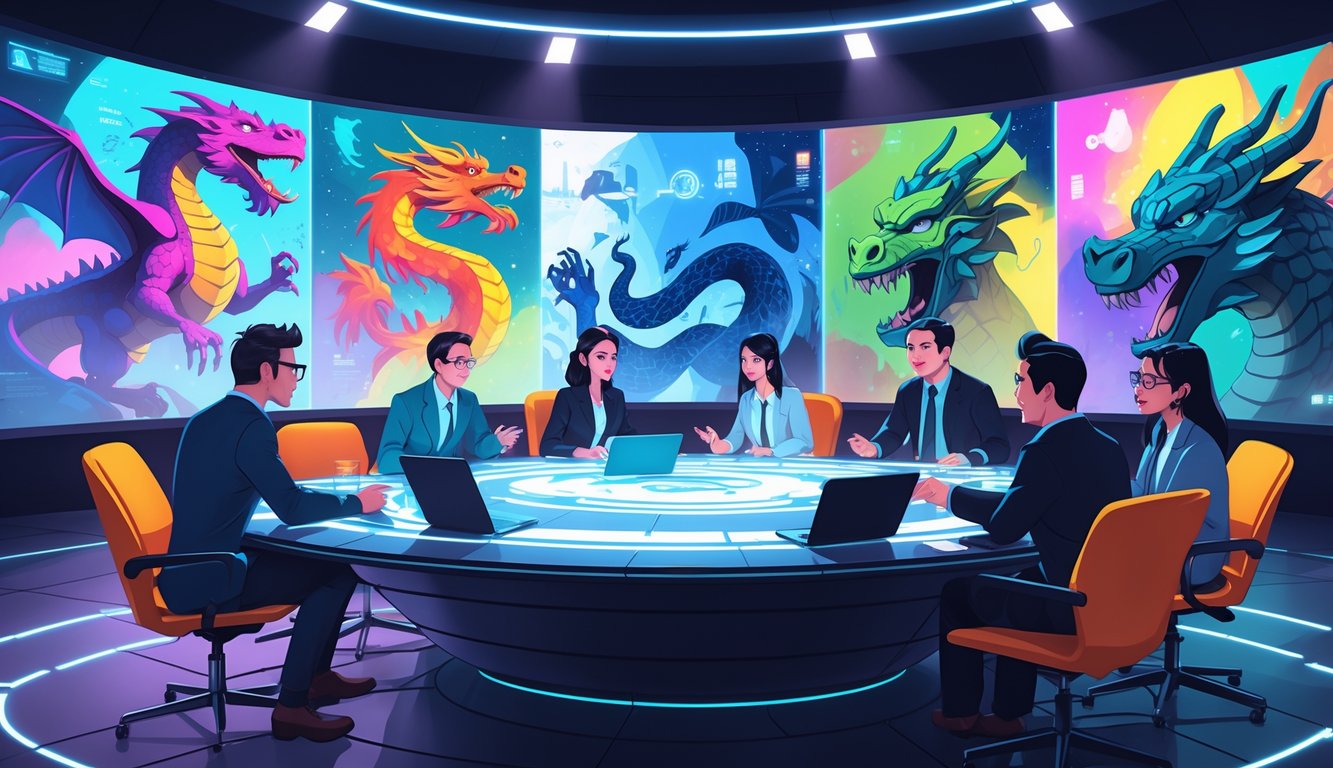
Okay, so, real talk—every time someone corners me about TV genres, I just want to laugh. Are they rigid? Please. The only thing rigid is my back after a pitch meeting. TV writers all know genres are, I dunno, like Play-Doh that’s been left out in the rain. They’re supposed to snap together, but mostly they ooze into each other because, let’s be honest, audiences get bored in about three seconds. Honestly, the “future” of TV genres? It’s whatever Frankenstein’s monster of a show survives the algorithm that week. Forget those old labels—sitcom, drama, whatever—nobody’s following that script. Especially not if you’re pitching to a streamer that’s got data saying viewers watch eco thrillers after binging reality dating. (What even is that taste profile?)
Philip Levens, bless him, basically shouted it—open Netflix or Hulu and you’re not picking comedy or drama, you’re lost in some genre labyrinth with no map. The platforms count every click, every weird binge, and then the execs pretend they can explain it. TV’s mutating so fast even the people in charge are like, “Wait, is this a satire or a thriller or an eco-thriller-satire?” Meanwhile, I’m trying to write a police procedural and the studio’s suddenly obsessed with audience-controlled outcomes. (Why do they think everyone wants to click stuff? See the interactive trend.)
Once, I actually tried to chase every trend at once. Disaster. You have no clue if your historical-cooking-game-documentary will get a cult following or just die in the “Recommended for You” graveyard. Any writer who claims they “know” the direction of genres is either lying or inhaling their own hype. We just hang on and hope nobody notices the seams. That’s the only rule, if there even is one.
How TV Writers Redefine Fiction Genres
It’s wild—genres in TV are less fences, more, I dunno, revolving doors? Like, what is “drama” even supposed to mean when Atlanta does crime, surrealism, and then suddenly it’s a mall sitcom? I’ll watch one episode and end up googling “blue invisible car explained” at 3 a.m. Execs love their metrics, but writers? We change lanes mid-season, nobody cares, and it’s not even risky—nobody remembers whose idea the “rules” were. Structure and setting, all of it, just bends around whatever the streaming algorithm wants today. I swear Netflix’s user interface has messed with genres more than any grad student with a theory.
Genre Evolution in Television
Picture this: I’m half-watching The Leftovers, Fleabag, and The Expanse, and not one of them can stick to a genre for longer than a week. Sci-fi bleeds into magical realism, comedy gets dark, romance evaporates, then comes back as slapstick. Walk into any writers’ room and they’ll tell you genre is just a buffet—grab what works, ignore the rest.
There’s a SpringerLink study calling TV “a literature of collisions.” Sounds fancy, but honestly, by episode eight, nobody’s planning anything. Budget, time, whatever actors are free that day—those things shove genres around way more than any grand vision. One time, an assistant told me, “We mess with genre just to keep the cast from falling asleep.” That’s the level of science here.
Nobody blinks when a procedural morphs into a ghost story or a workplace comedy suddenly gets all existential. As long as people keep watching, nobody cares what the label is. PR still slaps genres on the press kits, but does anyone read those?
Differences Between TV and Film Genres
Movies act like genres are sacred—action, rom-com, horror, blah blah. TV’s just over here shouting, “Whatever, just don’t turn it off.” Someone told me HBO’s official stance is “genre-fluid.” That’s not a strategy, that’s a panic attack. TV’s supposed to fill every gap, pivot on a dime, stretch a story for 50 episodes if it keeps the lights on. Movies? You get two hours and then you’re done. Enjoy your genre shot glass.
Look at FX’s Fargo—it jumps from neo-noir to true crime to black comedy to regional drama, sometimes in one episode. Would a movie audience put up with that? Doubt it. Noah Hawley said the network never asked what genre he was making, just if it would still “feel” like Fargo. Try pulling that at a film studio and see how fast you get fired. TV’s got dirty hands, and if a script goes from gritty to goofy, they’ll just call it “unique tone.” I once watched a soap opera pretend to be found footage horror for two episodes, then just… stop. New director, new vibe, nobody cared.
Influence of Setting and Structure
Settings in TV? Total chaos. One minute you’re in a Massachusetts hospital, next you’re in purgatory. (Lost writers still argue about that.) TV’s structure—season arcs, not neat three-act movies—means you can wander, jump, or just straight-up reboot the genre mid-season. What even was season two of True Detective? Not the first, that’s for sure.
Writers just build worlds, hop settings, split timelines, ignore logic if it serves the episode’s rhythm. I sat in a pitch where a showrunner literally rolled dice to pick the next episode’s setting: ship, planet, city, “nowhere,” whatever. TV’s structure just eats this up and keeps going. Rock & Art says structural innovation is the rule now, not the exception.
So, yeah, the “rules” of setting and structure? Not just bent—totally rewritten, usually at 2 a.m. with too much coffee and not enough time. Sometimes someone says “let’s just put them in the past and call it a plot device,” and it sticks because, well, why not?
The Future of Genre-Bending Shows

Network execs? Still clueless. Studios chase the next simple hit, but writers just mash up genres and throw in a twist because, honestly, nobody’s been fired for being weird yet. Audiences binge half a season of “what even is this?” and then argue online. Nobody agrees if drama plus horror plus sci-fi is “innovative” or just a budget nightmare.
Hybrid Genres and Emerging Trends
Every pitch meeting, same thing: execs want “high concept,” so I mumble, “It’s a detective show with quantum ghosts.” My agent rolls his eyes, quotes some genre blending stat, and suddenly the buyers are paying attention. You mash two genres, add a meta twist, and now there’s talk of Emmys for “Most Disorienting Narrative.”
Table reads? Pure chaos. Try blending horror with sitcom timing—suddenly you’ve got a possessed mom riffing about WiFi. Execs ask, “Is this a thriller or short-form paranormal workplace?” Industry keeps rewarding risk, so more hybrids, more categories, more confusion. Viewers get no clear genre promise and, apparently, that’s the hook now.
Blending Drama, Science Fiction, and Horror
One editor told me, “Nobody wants straight science fiction unless there’s a family crisis and some body horror.” So, you write a drama about a scientist hacking her sister’s DNA, toss in horror (real autopsies, not dream demons—unless they’re funny), and hope the studio bites. Why did “Stranger Things” work? It’s an 80s stew: monsters, family drama, kitchen sink.
Blending sci-fi and horror? New rules every episode. One day it’s ghosts, next it’s nanotech. Writers’ rooms order pizza, argue, and decide what to kill off or leave dangling. Some genre mashups even win awards, which is wild because the scripts usually start with “let’s blend three things and see if legal objects.”
Impact of Creative Control on Innovation
Here’s what bugs me: networks act like “creative control” just means a bigger office, but really it’s why you suddenly get a horror episode about climate change disguised as a period piece. No micromanagement? Suddenly everyone’s pitching wild cross-genre arcs just to prove a point. I’ve seen writers push for the weirdest experiments simply because nobody’s stopping them.
Streaming writers warn, “Don’t let marketing near it, they’ll wreck the theme and kill the best episode.” Writers Digest folks say the same: genre cross-pollination explodes when nobody’s fighting with legacy gatekeepers. The biggest leaps—mutated genres, narrative risks—always come when the writers’ room isn’t arguing with suits about scene length.
Still don’t know why the coffee’s always terrible. Maybe execs like it that way.



